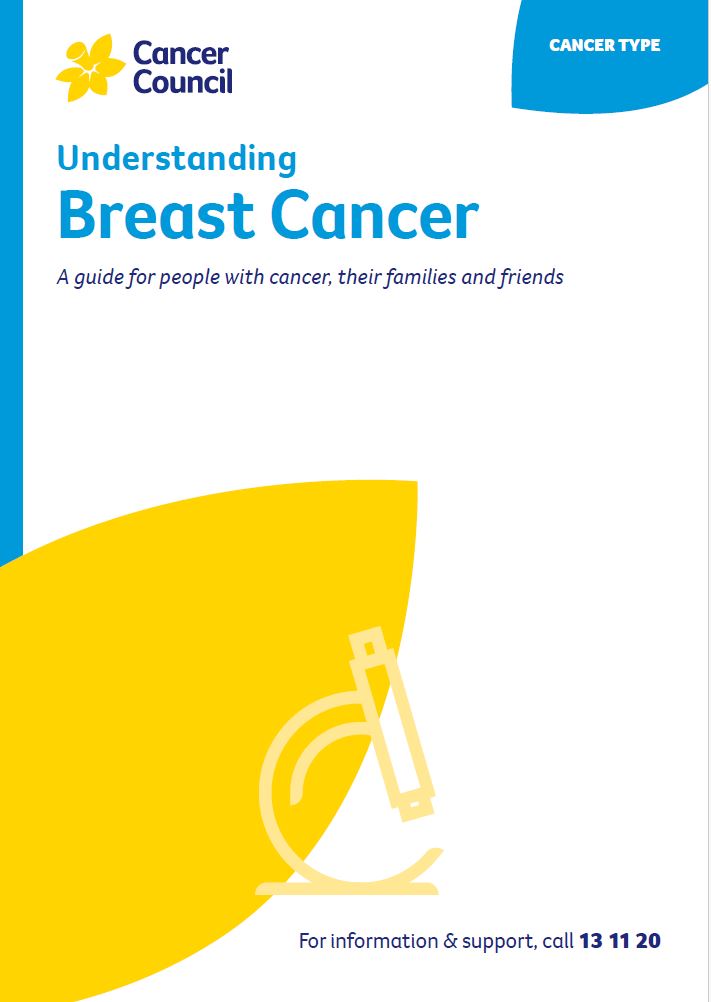- Home
- Breast cancer
- Treatment
- Chemotherapy
Chemotherapy for breast cancer
Chemotherapy uses drugs to kill cancer cells or slow their growth. It may be used before or after surgery.
Learn more about:
- When is chemotherapy used?
- Having chemotherapy
- Side effects of chemotherapy
- Video: What is chemotherapy?
When is chemotherapy used?
It is often used for breast cancers that are not sensitive to hormone therapy, are HER2+ or triple negative, or for inflammatory breast cancers. Chemotherapy is sometimes used for hormone receptor positive breast cancers.
Having chemotherapy
Different types of chemotherapy drugs are used. The choice of drugs will depend on the type of cancer, how far it has spread and what other treatments you are having.
Usually, you will have a combination of drugs. Common drugs include carboplatin, cyclophosphamide, docetaxel, doxorubicin, epirubicin and paclitaxel.
Your treatment team may also refer to the drugs by their brand names, or letters like AC or TC. Your medical oncologist will talk to you about the most suitable types of chemotherapy drugs, as well as their risks and side effects.
For more information, visit eviq.org.au.
Generally, chemotherapy is given through a vein (intravenously).
You will usually be treated as an outpatient, but occasionally you may have to stay in hospital overnight. Chemotherapy is usually given once every 1–3 weeks for 3–6 months.
Side effects of chemotherapy
Chemotherapy damages cells as they divide. This makes the drugs effective against cancer cells, which divide rapidly. However, some normal cells – such as hair follicles, blood cells and cells inside the mouth or bowel – also divide rapidly. Side effects happen when chemotherapy damages these normal cells. Unlike cancer cells, normal cells can recover, so most side effects are temporary.
See below for common side effects.
Nausea
You may feel sick for a few hours or days after each treatment. Not everyone feels sick, and you’ll be given medicine to help prevent it. Some medicines may cause constipation; talk to your doctor about this.
Diarrhoea
You may have loose, watery stools and feel like you urgently need to go to the toilet. You may be given medicine to manage diarrhoea.
Hair loss
You may lose the hair from your head and other areas of the body (e.g. eyebrows, underarms and pubic area). Cold caps may prevent hair loss on your head in some cases.
For more on this, see Hair loss and cancer.
Swelling
Some medicines used with chemotherapy drugs can cause excess fluid (fluid retention) to build up in the body. This can affect the arms and the trunk, but it usually gets better when treatment ends.
Changes to fertility
Chemotherapy can cause infertility in females and males. If you may want to have children in the future, it’s essential that you talk to your cancer specialists about your options and ask for a referral to a fertility specialist before treatment starts.
For more on this, see Fertility and cancer.
Heart problems
The risk is small but chemotherapy can sometimes damage the heart muscle (cardiomyopathy). Your heart health will be checked before, during and after treatment. If you are at risk of heart damage, you may be offered other types of drugs.
Peripheral neuropathy
You might develop tingling in your hands or feet. This is called peripheral neuropathy.
Other side effects
These include an increased infection risk, fatigue, mouth ulcers, constipation, and memory changes.
Learn more about chemotherapy.
→ READ MORE: Hormone therapy for breast cancer
Video: What is chemotherapy?
If you have cancer, chemotherapy may play a big role in your treatment plan. Learn more in this short video.
Podcast: Making Treatment Decisions
Listen to more episodes from our podcast for people affected by cancer
More resources
Dr Diana Adams, Medical Oncologist, Macarthur Cancer Therapy Centre, NSW; Prof Bruce Mann, Specialist Breast Surgeon and Director, Breast Cancer Services, The Royal Melbourne and The Royal Women’s Hospitals, VIC; Dr Shagun Aggarwal, Specialist Plastic and Reconstructive Surgeon, Prince of Wales, Sydney Children’s and Royal Hospital for Women, NSW; Andrea Concannon, consumer; Jenny Gilchrist, Nurse Practitioner Breast Oncology, Macquarie University Hospital, NSW; Monica Graham, 13 11 20 Consultant, Cancer Council WA; Natasha Keir, Nurse Practitioner Breast Oncology, GenesisCare, QLD; Dr Bronwyn Kennedy, Breast Physician, Chris O’Brien Lifehouse and Westmead Breast Cancer Institute, NSW; Lisa Montgomery, consumer; A/Prof Sanjay Warrier, Specialist Breast Surgeon, Chris O’Brien Lifehouse, NSW; Dr Janice Yeh, Radiation Oncologist, Peter MacCallum Cancer Centre, VIC.
View the Cancer Council NSW editorial policy.
View all publications or call 13 11 20 for free printed copies.

